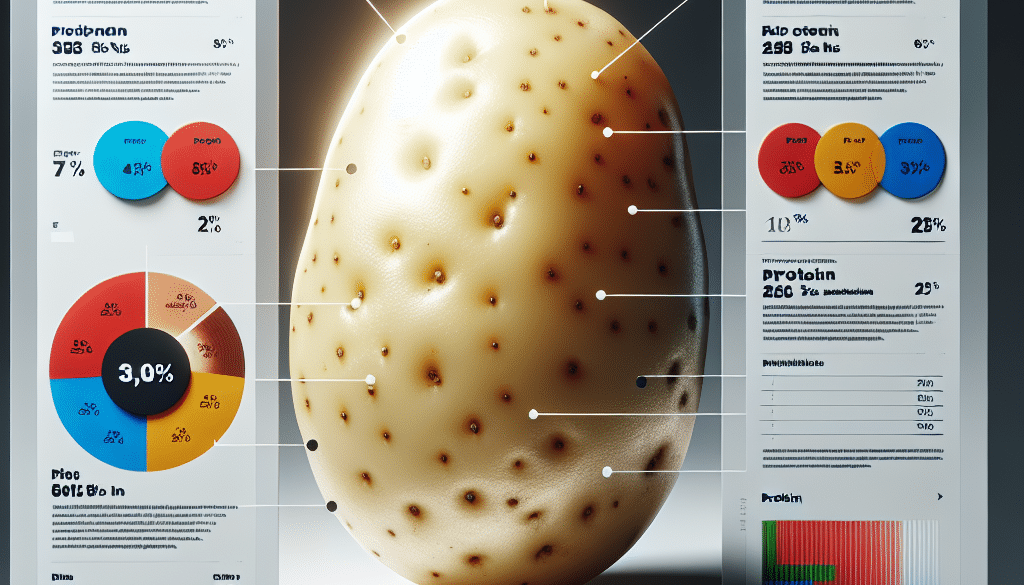Do White Potatoes Have A Lot Of Protein?
-
Table of Contents
- White Potatoes and Protein Content: A Comprehensive Analysis
- Understanding the Nutritional Value of White Potatoes
- Protein Content in White Potatoes
- Comparing White Potatoes to Other Protein Sources
- Role of White Potatoes in a Protein-Rich Diet
- Health Benefits and Considerations of White Potatoes
- White Potatoes in Different Diets
- Case Studies and Research on Potato Protein
- Conclusion: The Protein Profile of White Potatoes
- Discover ETprotein’s High-Quality Protein Products
White Potatoes and Protein Content: A Comprehensive Analysis

When it comes to protein sources, white potatoes are not typically the first food that comes to mind. Often overshadowed by their colorful counterparts like sweet potatoes, white potatoes are a staple in many diets around the world. But how much protein do these tubers actually contain? In this article, we delve into the nutritional profile of white potatoes, examining their protein content and how they fit into a balanced diet.
Understanding the Nutritional Value of White Potatoes
White potatoes, scientifically known as Solanum tuberosum, are a versatile and widely consumed vegetable. They are a significant source of carbohydrates, fiber, vitamins, and minerals. But when it comes to protein, how do they measure up?
Protein Content in White Potatoes
Protein is an essential macronutrient necessary for building and repairing tissues, making enzymes and hormones, and supporting overall health. The amount of protein in white potatoes can vary based on the size of the potato and how it is prepared. On average, a medium-sized (173g) baked white potato with skin contains about 4 grams of protein. While this is not a high amount compared to other protein-rich foods like meats, legumes, or dairy products, it still contributes to the daily protein intake.
Comparing White Potatoes to Other Protein Sources
When compared to other plant-based protein sources, white potatoes offer less protein per serving. For instance, a cup of cooked lentils boasts about 18 grams of protein, while a cup of chopped broccoli provides approximately 2.6 grams. Animal-based protein sources, such as a 3-ounce serving of chicken breast, contain around 26 grams of protein, highlighting a significant difference in protein density.
Role of White Potatoes in a Protein-Rich Diet
While white potatoes may not be a protein powerhouse, they can still play a role in a protein-rich diet. Here’s how:
- Complementary Proteins: Pairing white potatoes with other protein sources, such as dairy, meat, or legumes, can create a complete protein meal with all the essential amino acids.
- Post-Workout Recovery: The combination of protein and carbohydrates in white potatoes makes them a good option for post-exercise recovery meals.
- Dietary Diversity: Including a variety of foods in your diet ensures a range of nutrients, and white potatoes contribute valuable vitamins and minerals alongside their protein content.
Health Benefits and Considerations of White Potatoes
White potatoes offer several health benefits beyond their protein content:
- Vitamin C: They are a good source of vitamin C, which is important for immune function and skin health.
- Potassium: High in potassium, white potatoes can help maintain normal blood pressure levels.
- Fiber: With skin on, they provide dietary fiber that supports digestive health and can aid in weight management.
However, it’s important to consider the preparation method of white potatoes. Frying or adding excessive butter and sour cream can increase the calorie and fat content, potentially offsetting their health benefits.
White Potatoes in Different Diets
White potatoes can fit into various dietary patterns, including vegetarian, vegan, and gluten-free diets. They can serve as a staple food providing energy and nutrients. However, for those following a low-carb or ketogenic diet, white potatoes may not be suitable due to their high carbohydrate content.
Case Studies and Research on Potato Protein
Research has shown that potato protein, extracted from the tuber, can be an effective source of high-quality protein. Studies have indicated that potato protein can stimulate muscle protein synthesis similarly to animal-based proteins, making it an interesting area for further research, especially in the context of plant-based diets and sports nutrition.
Conclusion: The Protein Profile of White Potatoes
In conclusion, while white potatoes do contain protein, they are not considered a high-protein food. They provide approximately 4 grams of protein per medium-sized potato, which can contribute to daily protein needs, especially when combined with other protein sources. White potatoes also offer other nutritional benefits, including vitamins, minerals, and fiber. They can be a part of a balanced diet when prepared healthily and consumed in moderation.
Discover ETprotein’s High-Quality Protein Products
If you’re looking to supplement your diet with additional protein, ETprotein offers a range of organic bulk vegan proteins that can complement your nutritional intake. Their products, including various plant-based proteins and L-(+)-Ergothioneine, are designed to meet the needs of various industries and dietary preferences. With a commitment to non-GMO, allergen-free, and high-purity ingredients, ETprotein is a reliable choice for enhancing your protein consumption.
About ETprotein:
ETprotein, a reputable protein and L-(+)-Ergothioneine (EGT) Chinese factory manufacturer and supplier, is renowned for producing, stocking, exporting, and delivering the highest quality organic bulk vegan proteins and L-(+)-Ergothioneine. They include Organic rice protein, clear rice protein, pea protein, clear pea protein, watermelon seed protein, pumpkin seed protein, sunflower seed protein, mung bean protein, peanut protein, and L-(+)-Ergothioneine EGT Pharmaceutical grade, L-(+)-Ergothioneine EGT food grade, L-(+)-Ergothioneine EGT cosmetic grade, L-(+)-Ergothioneine EGT reference grade and L-(+)-Ergothioneine EGT standard. Their offerings, characterized by a neutral taste, non-GMO, allergen-free attributes, with L-(+)-Ergothioneine purity over 98%, 99%, cater to a diverse range of industries. They serve nutraceutical, pharmaceutical, cosmeceutical, veterinary, as well as food and beverage finished product distributors, traders, and manufacturers across Europe, USA, Canada, Australia, Thailand, Japan, Korea, Brazil, and Chile, among others.
ETprotein specialization includes exporting and delivering tailor-made protein powder and finished nutritional supplements. Their extensive product range covers sectors like Food and Beverage, Sports Nutrition, Weight Management, Dietary Supplements, Health and Wellness Products, and Infant Formula, ensuring comprehensive solutions to meet all your protein needs.
As a trusted company by leading global food and beverage brands and Fortune 500 companies, ETprotein reinforces China’s reputation in the global arena. For more information or to sample their products, please contact them and email sales(at)ETprotein.com today.












